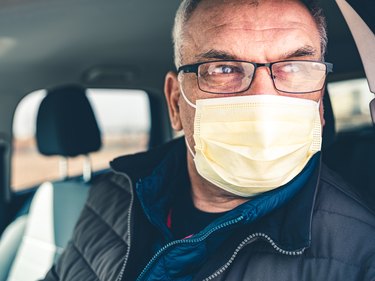
Wearing glasses can do a lot of things, from blocking UV rays to topping off a Clark Kent-inspired Halloween costume (and, yes, correcting your vision). But can donning spectacles give you the superhero-like power to fend off COVID-19, too?
While the Centers for Disease Control and Prevention (CDC) recommend wearing face masks and sticking to social distancing to help prevent your exposure to the novel coronavirus, protective eyewear (like glasses or goggles) isn't on the list of safety recs for the general public. But new research, published September 2020 in JAMA Ophthalmology, appears to imply that sporting eyeglasses offers an extra layer of protection.
Video of the Day
Video of the Day
We asked Lisa Lockerd Maragakis, MD, MPH, an infectious disease specialist and associate professor of medicine at Johns Hopkins School of Medicine, whether glasses or goggles should really be added to your armor against the coronavirus.
Get tips on how to stay healthy, safe and sane during the novel coronavirus pandemic.
First Things First: Can You Get COVID-19 Through Your Eyes?
"Yes, the virus can infect you through your eyes," Dr. Maragakis says. "This is why it is important to wash your hands and avoid touching your face or rubbing your eyes" when you're out and about.
Still, it's not likely you'd get infected this way. COVID-19 is thought to spread mainly through respiratory droplets (generated by an infected person who sneezes, coughs or talks) that make their way through the mucous membranes in the nose or mouth of others close by (within six feet), per the CDC.
So When Are Glasses or Goggles a Good Idea?
"Eye protection is part of the personal protective equipment that health care providers wear in clinical settings — goggles or a face shield help to protect the eyes from splashes, sprays or respiratory droplets," Dr. Maragakis says.
For people outside of health care settings who regularly come into close contact with others or whose jobs require frequent face-to-face interactions (think: restaurant employees, grocery store clerks and public transit workers), eyewear may also be a good option in addition to a mask.
But should the average person don protective eyewear? The authors of the JAMA Ophthalmology study seem to think so. In a cohort of 276 patients hospitalized with the coronavirus in China, investigators found an association between wearing eyeglasses and a lower rate of COVID-19 infection.
The researchers "hypothesize that people may touch their eyes less frequently when they are wearing glasses" and thus prevent transmitting the virus from the hands to the eyes, Dr. Maragakis explains.
But she cautions that these are only preliminary results and the correlation is unclear. "More study is needed to verify whether there is an added benefit from wearing eye protection — in addition to wearing a mask and practicing physical distancing — in public settings."
The takeaway: For the average Joe or Jill, wearing protective eye gear won't hurt, but it's probably easier to just avoid touching your face in public.
Face Masks Still Offer the Best Protection
A properly fitted mask is still the best way to guard against catching (or spreading) COVID-19.
Remember, the coronavirus' primary mode of transmission appears to be through infected respiratory droplets that enter the nose or mouth. So your best offense and defense against the virus is to wear a mask — kind of like a superhero.
Concerned About COVID-19?
Read more stories to help you navigate the novel coronavirus pandemic:
Was this article helpful?
150 Characters Max
0/150
Thank you for sharing!
Thank you for your feedback!
Is this an emergency? If you are experiencing serious medical symptoms, please see the National Library of Medicine’s list of signs you need emergency medical attention or call 911.